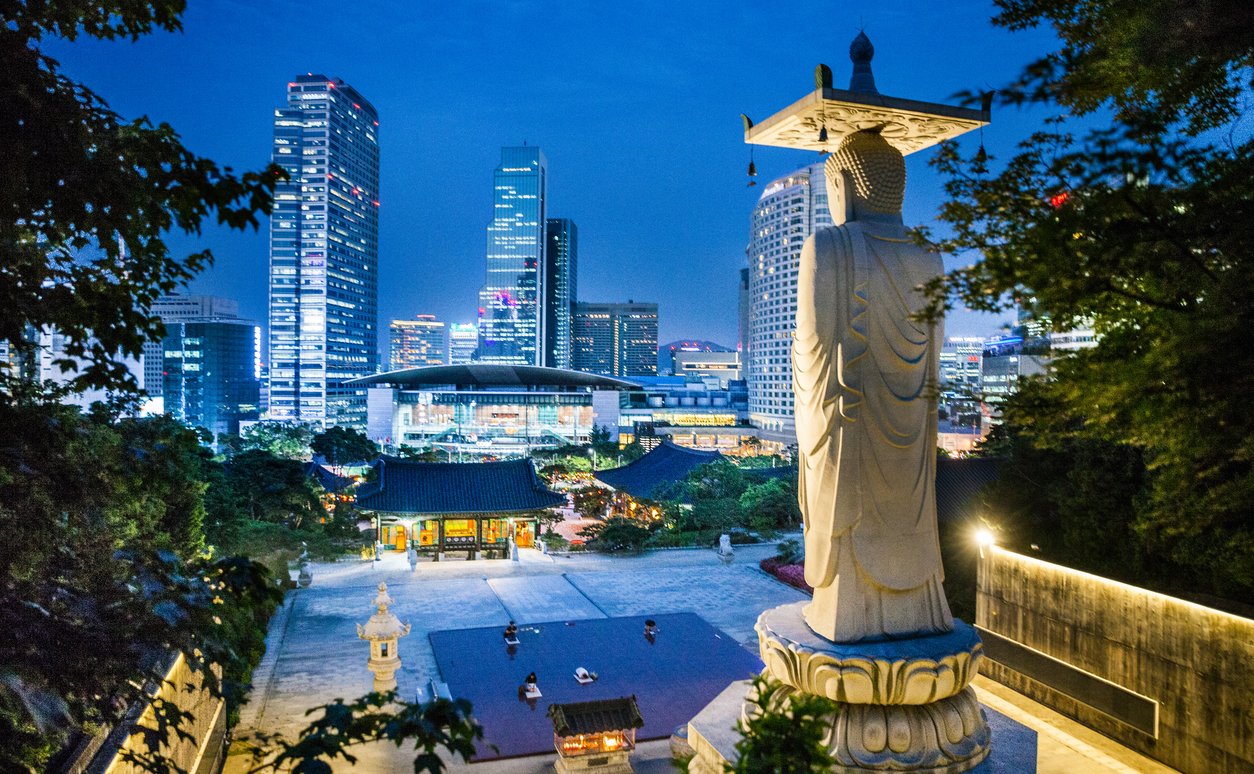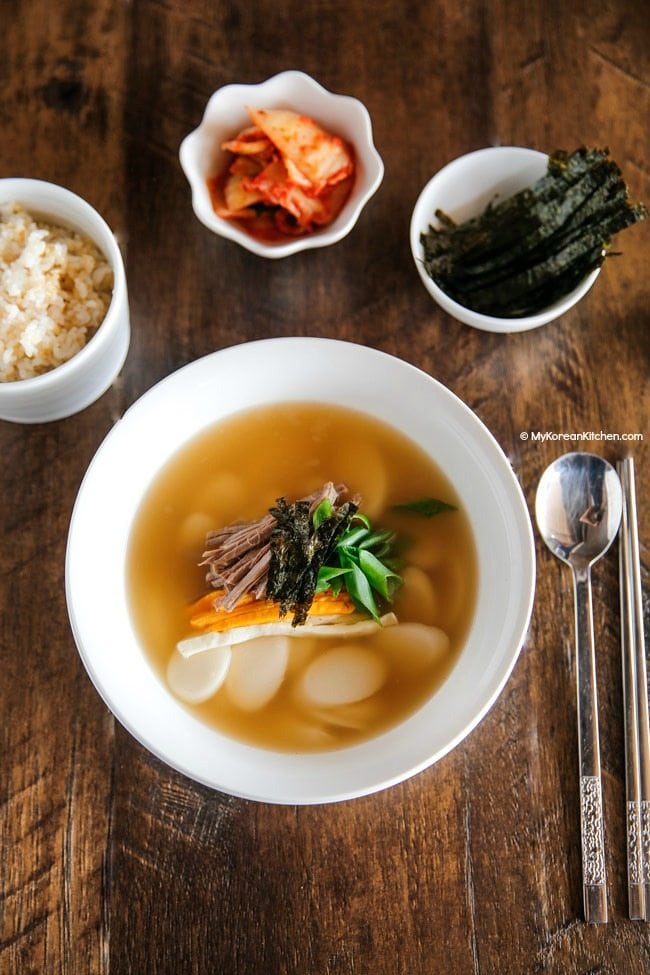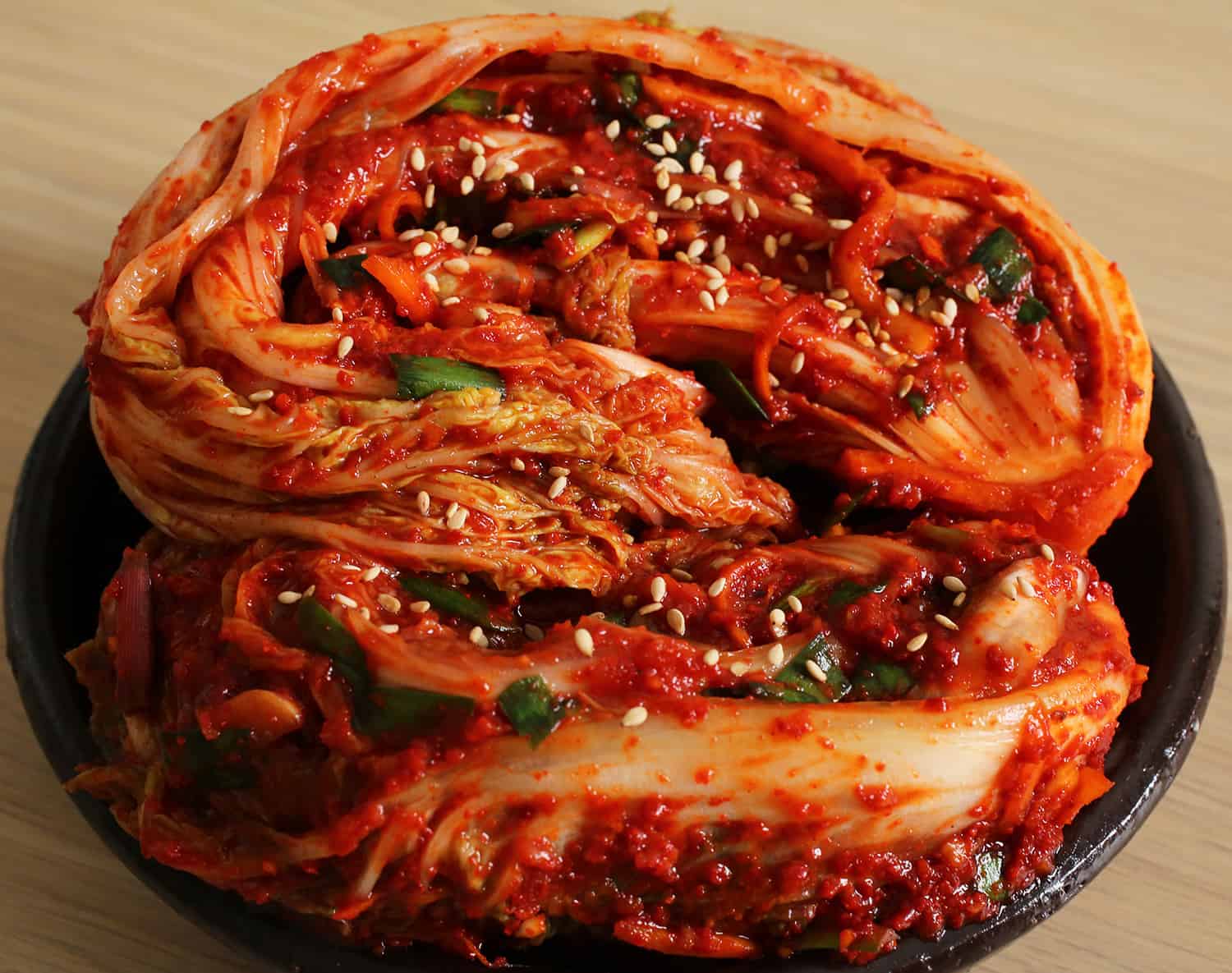" South Korea"

Paragraph:1 Mixed Information
 South Korea is a country in East Asia, on the southern half of the Korean peninsula. The name Korea is derived from Gorguryeo, which was one of the great powers in East Asia. South Korea lies in the north temperate zone and has a mountainous terrain. The weather is very humid and extreme. So it is very hot in the summer and very cold in the winter. It has a great number of population which is 51.4 million and it has 100'363 km2 terrain. The currency of South Korea is South Korean won. The most abundant religions in South Korea are Buddhism, Catholicism, and Protestantism. South Korean people speak Korean. The capital city is Seoul, and Seoul is the largest city in South Korea with about 10 million population. There are a lot of exotic things and many shopping malls that sell ornate items in Seoul. That's why every year, about 17 million tourists from all around the world go to South Korea to buy exotic things and to see Korean unique traditions.
South Korea is a country in East Asia, on the southern half of the Korean peninsula. The name Korea is derived from Gorguryeo, which was one of the great powers in East Asia. South Korea lies in the north temperate zone and has a mountainous terrain. The weather is very humid and extreme. So it is very hot in the summer and very cold in the winter. It has a great number of population which is 51.4 million and it has 100'363 km2 terrain. The currency of South Korea is South Korean won. The most abundant religions in South Korea are Buddhism, Catholicism, and Protestantism. South Korean people speak Korean. The capital city is Seoul, and Seoul is the largest city in South Korea with about 10 million population. There are a lot of exotic things and many shopping malls that sell ornate items in Seoul. That's why every year, about 17 million tourists from all around the world go to South Korea to buy exotic things and to see Korean unique traditions.Tourist Attractions:
- Lotte World Tower -Gyeongbokgung Palace -Namsan
- N Seoul Tower - Bukchon Hanok Village - Lotte World ... etc
-"Everland" theme park

- Everland theme park

- Lotte World Tower
Paragraph:2 Korean culture, tradition and cuisine.
South Korea has a lot of unique traditions that other countries do not have, and here are the mmost astonishingly rare traditions of Korean people. First of all, they have so many traditional rulesv
for only eating. The most common rule is that older people should sit at the dining table first. This tradition is very important to them. Historically, Korean people used to not give any meal to someone who has sat before the older one. The second essential thing is to keep your mouth closed while chewing food and not to make any noises while chewing. Strangely, if someone makes any sounds, that person will be ejected soon. The only reason for these traditions is that Korean people really care about others and they do not want to disturb anyone at any time. Also, there is a traditional holiday (and celebration) in South Korea called "Korean New Year" or "Seollal". Korean New Year is an annual well-known celebration observed by every single Korean people all around the world. This traditional celebration does not take place at the same time every year, because the date is planned by the Korean lunar calendar. However, the Gregorian dates are different from each other, Korean New Year takes place on the first day of the Korean lunar calendar each year at all. For example, it took place on the 16th of February (the first day of the Korean lunar calendar of 2018) in 2018 and this year it has taken place on the 5th of February ( the first day of the Korean lunar calendar, too). It usually lasts for 3 days (the day before Korean New Year, Korean New Year itself, and the day after Korean New Year) and on those days South Korea truly comes alive. Every single street is decorated with colorful ribbons and other things that are brightly colored. During those traditional holidays, the majority of Koreans visit family, perform ancestral rites, wear "Hanbok"(Korean national clothing),
eat traditional food (Tteokguk soup or sliced rice cakes) and play folk games. Additionally, children often receive money or present after performing a formal bow. Besides the Korean New Year, there is a festival named "Daeboreum". Daeboreum is a festival that celebrates the first full moon of the new year of the lunar Korean calendar. This is the Korean version of the First Full Moon Festival. During this festival, and it is accompanied by many traditions. In addition, it does not take place at the same time every year, just like the Korean New Year. In conclusion, we want to say that South Korea is a very beautiful country with many special cultures and traditions that you can not see in other countries.
 - Hanbok
- Hanbok  - Tteokgu
- Tteokgusoup
or sliced rice
cakes
Korean cuisine:
 Korean cuisine is very special and varies from other countries' cuisines. Korean cuisine is largely based on sea products, meat, rice, and vegetables. The most interesting thing is, traditional Korean meals are named for the number of side dishes (banchan) that accompany the steamed-cook short-grain rice. Also, one of the most popular side dishes is Kimchi, which is made from salted and fermented vegetables, mostly napa cabbage and Korean radishes with a variety of seasonings, including gochugaru (chili powder). Kimchi is nearly served with every Korean meal. Grains, legumes, gochujang, meat, condiments, and seasoning have significant roles in Korean cuisine, too! That's why Korean people use many types of grains and those types of things in their meal. For example, there are brown rice, brown sweet rice, black rice, barley, black pea ...etc. The most surprising thing is that they use dog meat, and the meal has dog meat is considered a supreme meal.
Korean cuisine is very special and varies from other countries' cuisines. Korean cuisine is largely based on sea products, meat, rice, and vegetables. The most interesting thing is, traditional Korean meals are named for the number of side dishes (banchan) that accompany the steamed-cook short-grain rice. Also, one of the most popular side dishes is Kimchi, which is made from salted and fermented vegetables, mostly napa cabbage and Korean radishes with a variety of seasonings, including gochugaru (chili powder). Kimchi is nearly served with every Korean meal. Grains, legumes, gochujang, meat, condiments, and seasoning have significant roles in Korean cuisine, too! That's why Korean people use many types of grains and those types of things in their meal. For example, there are brown rice, brown sweet rice, black rice, barley, black pea ...etc. The most surprising thing is that they use dog meat, and the meal has dog meat is considered a supreme meal.Here is the list of South Korean famous foods:
- Kimchi (fermented vegetables)
- Bulgogi ( marinated beef barbecue)
- Japchae (stir-fried noodles)
- Ddukbokki ( spicy rice cake)
- Seolleongtang (ox bone soup)
- Sundubu-jjigae (soft tofu stew)
- Samgyeopsal (pork strips
- Bibimbap ( mixed rice)
- Ramen...
In addition, ingredients and dishes vary by province.
Paragraph:3 Comparison
Our team members have discussed every aspect of South Korean traditions. As a result of our
discussion, we found some similarities and some differences between our traditions and South Korean traditions. In the first place, one similarity is that both Mongolian and South Korean people celebrate their own new year. Secondly, Mongolians and South Koreans both have the powerful effect of Buddhism. In the end, Mongolians and South Koreans both respect people who are older than them. So, these are the main similarities between Mongolian traditions and South Korean traditions. Also, there are some differences between our traditions, too! First of all, South Korean people eat a lot of seafood, but Mongolians do not. In the second place, Mongolians are nomadic, but South Koreans are not. In the end, South Koreans use a lot of spices in their meal, but Mongolians do not use any types of spice in our meal, because this is our tradition at all. These are the similarities and differences between their traditions and ours. Also, our team members found a piece of information that says South Korea has greatly influenced by the Japanese and Chinese cultures. We found only one similarity, that is a musical instrument. It is called "Gayageum" in South Korea and called "Ytga" in Mongolia. Historically, Mongolians and South Koreans both used to play this instrument. Except for this instrument, everything of Mongolian and South Korean cultures are different, because South Koreans have been lived in settled cities, but Mongolians have been lived in nomadic life. That's the only reason why their cultures are different from ours.
"Ytga" or "Gayageum":

Website names that we used:
www.wikipedia.com- South korea
- Cuisine of Korea
commisceo-global.com
globalization partners.com
Misheel- did the whole formatting and brought information about tradition
Emu-Ujin - prepared information
Sonoma - prepared information
B.Nomin - prepared information
Comments
Post a Comment